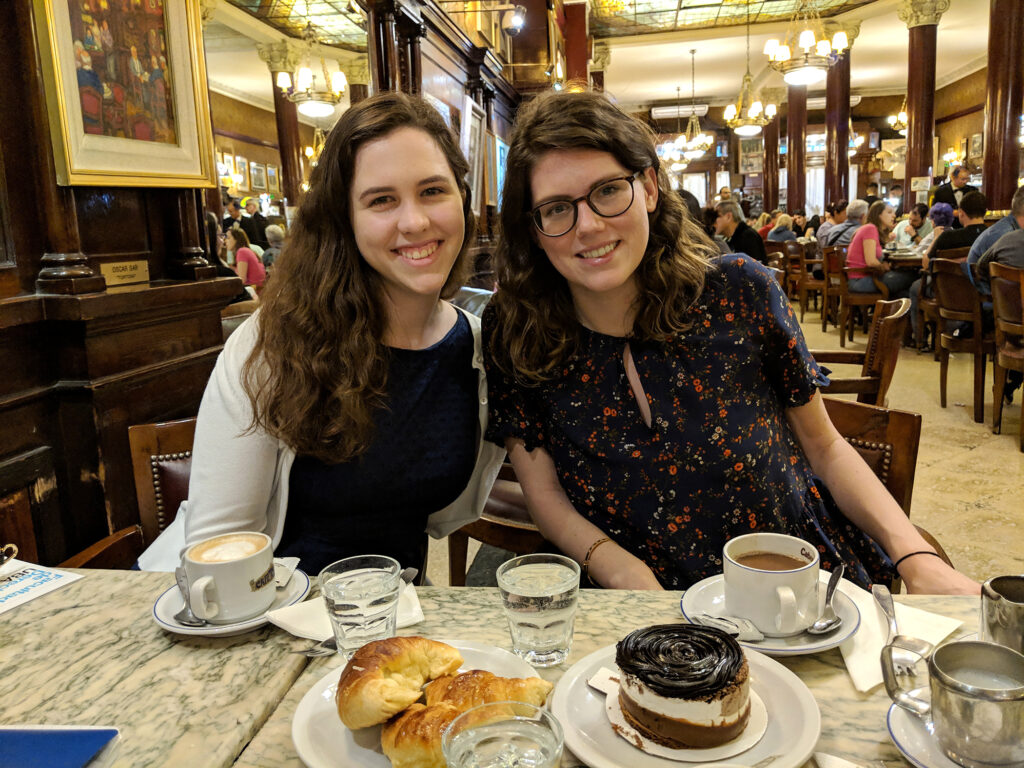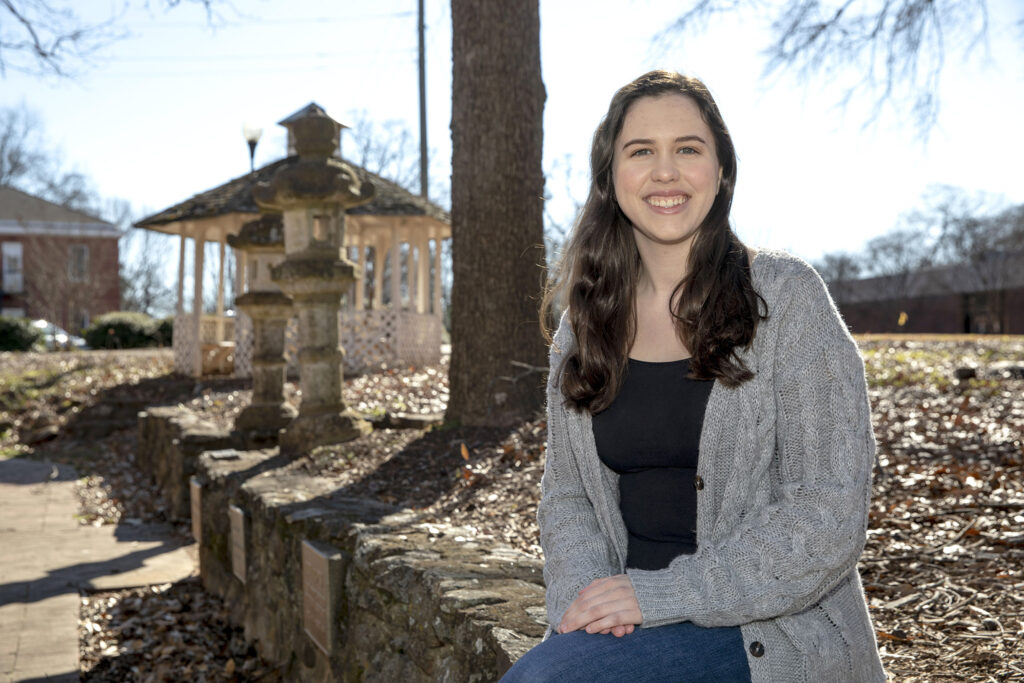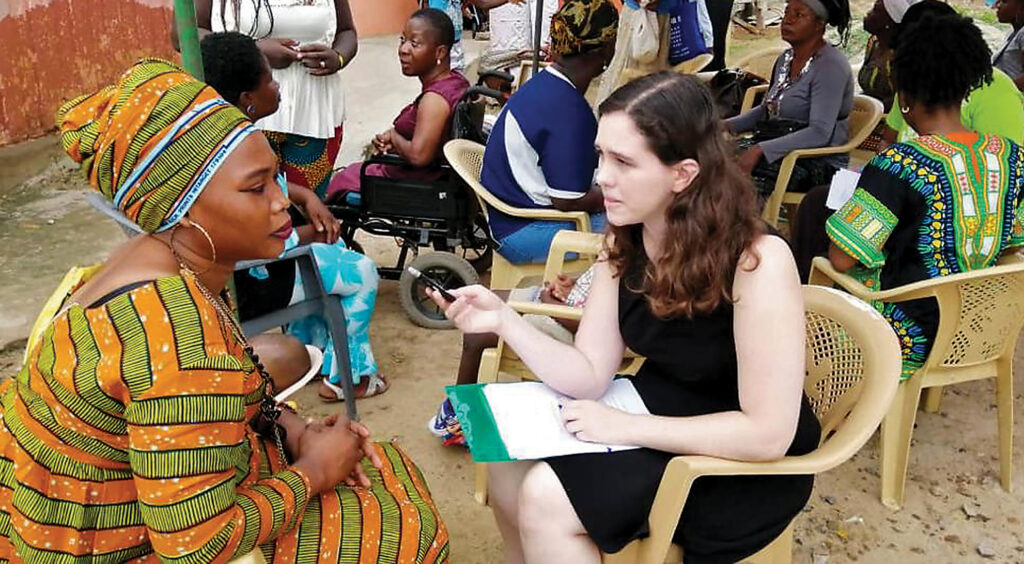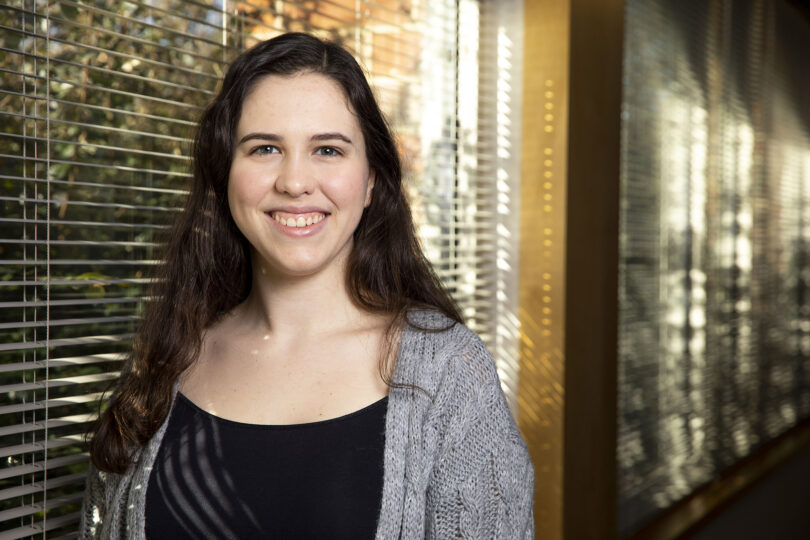For Victoria Fonzi, college is about the little moments with friends—cooking dumplings or stir fry together (pre-pandemic) and then debating the meaning of life.
“That’s the quintessential college thing too—to be able to talk about philosophical things and explore your beliefs,” she said.
Fonzi, a Foundation Fellow and Stamps Scholar who is majoring in cellular biology in the Franklin College of Arts and Sciences, is also pursuing a master’s degree in public health through the Double Dawgs program.

Victoria Fonzi and Isabelle Riddle traveled to Argentina as part of the Foundation Fellows trip in 2019.
A future physician, she’s tried to make the most of her time at UGA.
One of her favorite pieces of advice, borrowed from another Foundation Fellow, is: “Rejection hurts a lot, but it’s also a sign you’re aiming high enough. It’s so much better to live with rejection, rather than to live with regret.”
“If I see a program I’m interested in or an opportunity I want to pursue, I go for it. If it doesn’t work out, it’s OK, because I was aiming high enough,” she said
Summer internship
For her, that means pursuing something she’s interested in rather than holding back because it might not happen. Specifically, she applied for an internship at the Greater New York Hospital Association, thinking she had no chance. But she aimed high enough and got the internship.
Unfortunately, the internship planned for summer 2020 was canceled because of the pandemic. She then changed plans (in part thanks to connections with other Honors Program alumni) and interned at Gwinnett Clinic to fulfill the internship portion of her MPH. She learned about health care management and running a private practice—all while dealing with COVID-19.
While it wasn’t part of the initial plan, she helped to develop COVID-19 procedures. Her job was figuring out the most logical ways for staff to take care of patients coming in for normal visits while also accommodating COVID-19 testing. She also helped with making sure all the clinic locations had the correct supplies to do testing and paperwork.
This semester, she’s working one day a week at the clinic helping with vaccine workflow. In particular, she’s overseeing paperwork requirements—and making sure vaccines are recorded on registries for the clinic, state of Georgia and electronic medical records—and then creating a system for the other clinic locations to follow for the paperwork. The goal is to figure out the most efficient way to get the most people vaccinated in the shortest amount of time.
It’s so much better to live with rejection, rather than to live with regret.” —Victoria Fonzi
Future physician
Fonzi is finalizing her plans for starting medical school this fall and choosing between schools.
While she’s keeping her mind open about medical specialties, she’s interested in obstetrics and gynecology. She’s shadowed a few doctors in the field and described witnessing a birth as “just the most incredible thing I’ve ever experienced in my life. I don’t know how you would ever get tired of seeing that as a doctor.”
Delivery is a stressful, painful and scary process, she said. “But seeing the mother’s face transformed, when she gets to hold the baby for first time—it was incredible to watch the emotion of that moment, to see the relief and love, amazement and joy.”

At UGA, Victoira Fonzi has volunteered with Athens Prison Tutorial since her freshman year. Her background is in tutoring others—and the tutorial program tutors those in the Clarke County Correctional Institution and at diversion center transitioning back to being in the workforce. Much of the tutoring is basic skills: reading comprehension, order of operations, how to use a fraction. “When you see someone learn that, for the first time—and really understand it. You feel like you’ve accomplished something together and this is something they’re really going to be able to use,” she said. (Photo by Chad Osburn/UGA)
Journey to UGA
Fonzi had originally planned to attend Princeton, where she was accepted. But after attending Fellows weekend hosted by UGA’s Honors Program, she changed her mind. “Everyone seemed like they were genuinely friends,” she said. At other schools’ interview weekends, students didn’t seem to have the same friendship or connections.
“UGA’s fellowship funds experiences and has a real community. The fellowship is intentional in having retreats, book discussions, Fellows Library—little ways to get to know each other, to make it really special and foster this close community.”
Travels
Travel is also part of the Foundation Fellowship. Fonzi has traveled to Europe, South America and Africa while at UGA.
Her freshman year, she studied at Oxford University with the other Foundation Fellows. “It was my favorite month of my life,” she said. “It was just incredible to be able to take classes with an Oxford professor and have those debates not only in class but also in the kitchen, to get tea together and debate there.”
The fellows lived in the UGA house for a month—cooked dinner together, explored the town together—in what Fonzi said was the perfect length of time.
She then went to Prague to complete a shadowing program, where she got to see what a week of neurosurgery was like and then spent a week on an OB/GYN rotation.

The summer after her sophomore year, Victoria Fonzi spent two months doing research on health care in Ghana.
She’s also traveled to Argentina and Uruguay. Her fourth trip—to Ghana—was her most impactful. She spent two months with a small research nonprofit looking at how caregivers of children with cerebral palsy made decisions about what sorts of treatments to use for their children’s condition. Do they take them to the hospital for prescription medication, to a physio therapist, an herbalist, a spiritualist or pastor? Why did they choose they things? What did they think about the different types of treatments? She interviewed mothers about their experiences and treatment decisions.
“Between days spent haggling in the market, watching the sunset on the beach in Uruguay, and trying every ice cream flavor in the city, our week in the Southern Cone was nothing short of surreal,” she wrote in a travel log. “I will remember lunchtime conversations with local students and bus ride debates with other fellows as more than just fond memories. This trip challenged me to rethink many of my preformed opinions and left me with a new perspective.”
It’s what she’ll remember most—the moments spent with friends—in Athens or Africa, talking and laughing over a good meal.








